Natural herbal teas can be a great way to ease your seasonal allergies. Teas like echinacea and elderberry boost your immune system, while chamomile, ginger, and peppermint provide anti-inflammatory relief. You might find that ginger tea helps with congestion, or chamomile tea soothes nasal irritation. Caffeine-free options, like rooibos and hibiscus, also support relaxation. To brew, use high-quality loose leaf tea, steep for 5-10 minutes, and consider adding honey for extra comfort. As you sip, you'll experience the soothing warmth and benefits of these herbal allies, and there's even more to explore about creating your perfect blend.
Understanding Seasonal Allergies
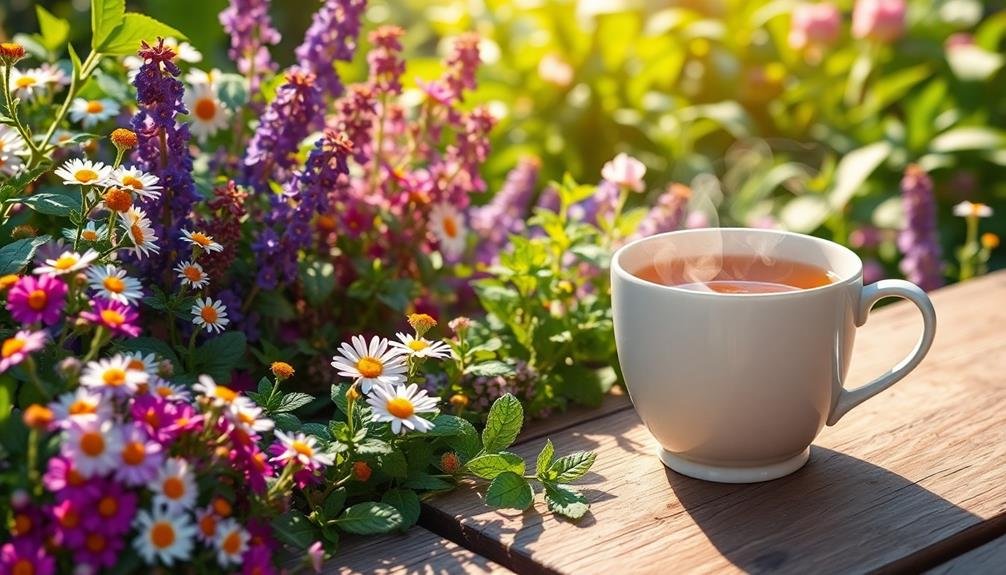
Seasonal allergies often affect many people during specific times of the year, particularly in spring and fall. These allergies occur when your immune system overreacts to allergens like pollen from trees, grasses, and weeds. When you breathe in these particles, your body mistakenly identifies them as threats and releases chemicals such as histamines. This reaction leads to symptoms like sneezing, itchy eyes, and nasal congestion.
You might notice that certain environments trigger your symptoms more than others. For example, spending time outdoors during high pollen counts can intensify your discomfort. To better manage your seasonal allergies, keeping track of pollen forecasts can help you plan outdoor activities. Consider limiting your time outside during peak pollen hours, typically early morning.
You should also pay attention to indoor allergens, such as dust mites and pet dander, which can exacerbate your symptoms. Regular cleaning and using air filters can create a more comfortable living space.
Understanding the triggers of your seasonal allergies is essential for effective management. By identifying these allergens, you can take proactive steps to reduce your exposure and alleviate your symptoms.
Benefits of Herbal Teas
Herbal teas offer fantastic benefits for your immune system, helping you fend off seasonal allergies more effectively.
Their anti-inflammatory properties can soothe your body's responses to allergens, providing much-needed relief.
Immune System Support
Boosting your immune system can be as simple as sipping on a warm cup of herbal tea. Many herbal teas are packed with vitamins, minerals, and antioxidants that can help strengthen your body's defenses.
For instance, echinacea is known for its immune-boosting properties, making it a popular choice during allergy season. When you drink echinacea tea, you're not just enjoying a soothing beverage; you're also potentially enhancing your body's ability to fight off seasonal ailments.
Another excellent option is elderberry tea. Packed with antioxidants, elderberry can help combat viruses and support overall immune function. Drinking elderberry tea regularly may not only improve your health but also make you feel more energetic and vibrant.
Don't overlook green tea, either. Its high levels of catechins can provide significant immune support.
Including a variety of herbal teas in your daily routine can make a noticeable difference in your overall health. So, when the pollen count rises, reach for a cup of herbal tea. It's a delicious way to give your immune system the boost it needs to tackle seasonal allergies effectively.
Anti-Inflammatory Properties
When you're dealing with seasonal allergies, turning to herbal teas can help calm inflammation in your body. Many herbal teas contain compounds that naturally reduce inflammation, which is essential when allergy symptoms flare up.
For instance, chamomile tea is known for its soothing effects and can help alleviate sinus pressure and irritation.
Another excellent option is ginger tea, packed with anti-inflammatory properties that can relieve congestion and promote better breathing.
Turmeric tea also stands out, thanks to curcumin, its active ingredient, which effectively combats inflammation and can ease allergy-related discomfort.
Peppermint tea is another great choice; it not only opens up your airways but also reduces inflammation in your nasal passages.
Consuming these herbal teas regularly can create a cumulative effect, leading to better overall management of your allergy symptoms.
Incorporating these anti-inflammatory herbal teas into your routine can be a simple yet effective way to find relief.
So, the next time you're feeling the seasonal itch, brew yourself a cup of one of these herbal wonders and let the natural properties work their magic.
You'll likely find yourself breathing easier and feeling more comfortable.
Caffeine-Free Tea Options
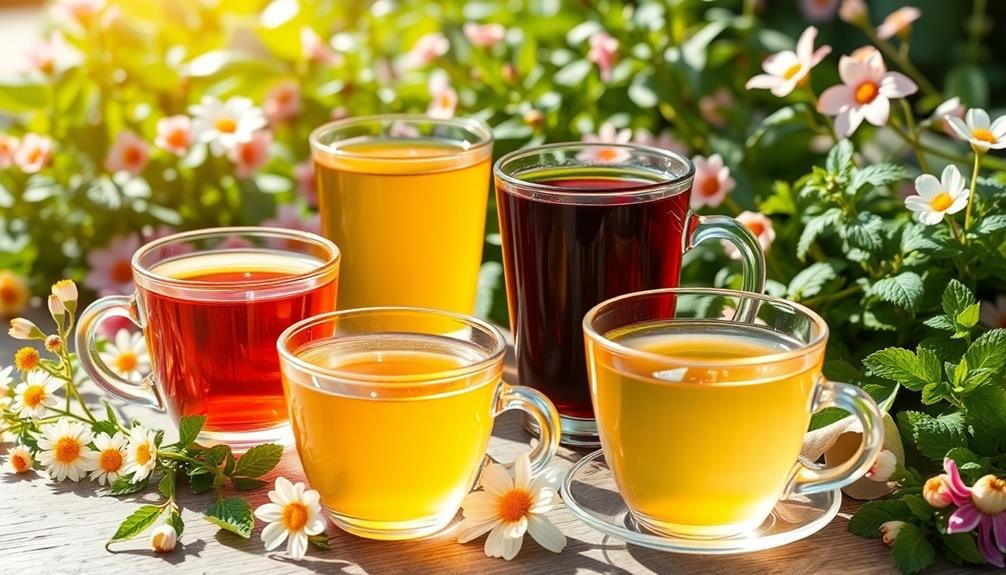
When it comes to caffeine-free tea options, you'll find a variety of herbal blends that can help soothe your seasonal allergies.
Each type of herbal tea offers unique benefits, and you'll want to explore different brewing techniques to get the most flavor and effectiveness.
Let's look at some popular herbal varieties and how to prepare them for the best results.
Herbal Tea Varieties
Herbal teas offer a delightful variety of caffeine-free options that can help alleviate the discomfort of seasonal allergies. One popular choice is chamomile tea. Known for its anti-inflammatory properties, chamomile can soothe your throat and reduce nasal congestion.
If you're looking for something with an invigorating twist, peppermint tea might be your go-to. Its menthol content can help open up your airways, making it easier to breathe.
Another fantastic option is ginger tea. Ginger has natural antihistamine effects, which can be particularly beneficial during allergy season.
You might also enjoy rooibos tea, rich in antioxidants and free of caffeine, making it a great option for relaxation while fighting off allergy symptoms.
For a floral touch, consider hibiscus tea. It not only tastes delicious but also supports your immune system, which can be helpful when pollen counts are high.
Lastly, look into elderflower tea, known for its ability to combat respiratory issues.
Brewing Techniques Explained
To brew the perfect cup of caffeine-free herbal tea, start by selecting high-quality loose leaf or bagged tea. Freshness matters, so opt for brands that prioritize quality.
Next, gather your tools: a kettle, a strainer (for loose leaf), and a cozy mug.
When you're ready, follow these steps for the best results:
- Boil water to the right temperature—most herbal teas do well with water just below boiling.
- Measure out the tea; one teaspoon per cup for loose leaf or one bag per cup.
- Steep the tea for about 5-7 minutes, allowing the flavors to develop fully.
- If you like, add honey or lemon for a touch of sweetness and zest.
Once you've brewed your tea, take a moment to inhale the aromatic steam. It's invigorating!
Sip slowly and let the warmth envelop you, easing your seasonal allergy symptoms.
Remember, the key to a delightful cup lies in the quality of your ingredients and the care you take while brewing.
Enjoy your caffeine-free herbal tea experience, and feel the relief wash over you.
Key Ingredients for Relief
Finding relief from seasonal allergies can be a challenge, but certain key ingredients in herbal teas can make a significant difference. Incorporating these ingredients into your daily routine can help alleviate symptoms like sneezing, congestion, and itchy eyes.
Here's a quick look at some powerful ingredients:
| Ingredient | Benefits |
|---|---|
| Nettle | Acts as a natural antihistamine, reducing sneezing and itching. |
| Peppermint | Opens nasal passages and helps to soothe inflammation. |
| Ginger | Provides anti-inflammatory properties, easing congestion and discomfort. |
By combining these ingredients in your herbal teas, you can create a soothing blend that targets your allergy symptoms. Nettle helps your body combat histamines, while peppermint provides a revitalizing taste and relief from nasal congestion. Ginger adds warmth and further supports your immune system.
Experiment with different combinations to find what works best for you. Whether you prefer a single ingredient or a blend, these key components can be your allies in battling seasonal allergies. Enjoy your cup of herbal tea, knowing you're taking a step toward feeling better.
Chamomile for Allergy Relief
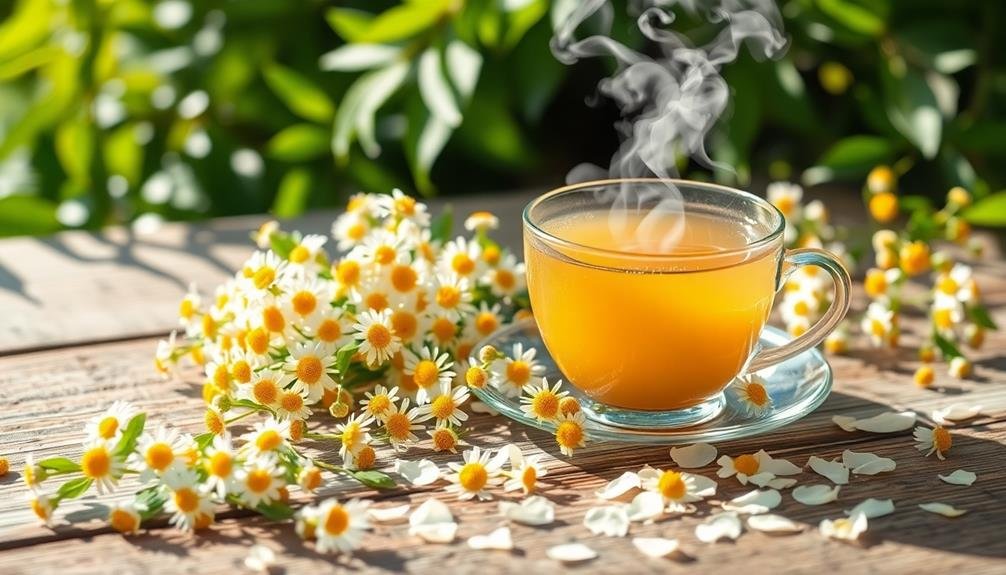
Chamomile is a powerful ally for allergy relief, thanks to its anti-inflammatory properties that can soothe your body's reactions.
You'll also benefit from its antioxidant effects, which help combat free radicals and support your immune system.
To get the most out of your chamomile tea, it's important to know the best brewing tips to maximize its benefits.
Anti-inflammatory Properties
Discover the soothing power of chamomile, a popular herbal tea known for its anti-inflammatory properties that can help alleviate seasonal allergy symptoms. When you're facing sneezing, itching, or congestion, a warm cup of chamomile can be your comforting ally. Its natural compounds work to reduce inflammation in your body, easing the discomfort that allergies can bring.
Imagine sipping on chamomile tea while feeling:
- Warmth radiating through your body, calming your senses.
- The gentle aroma of floral notes enveloping you, creating a serene atmosphere.
- The soft, soothing taste gliding smoothly over your palate, providing instant relief.
- A sense of tranquility washing over you, as the tea works to minimize your allergy symptoms.
Incorporating chamomile into your routine can be a simple yet effective way to manage your allergies.
Whether you brew it fresh or opt for convenient tea bags, each sip contributes to reducing inflammation and promoting a sense of well-being.
Antioxidant Benefits
Alongside its anti-inflammatory properties, chamomile also offers impressive antioxidant benefits that can further support your body during allergy season. Antioxidants play a vital role in neutralizing free radicals, which can contribute to inflammation and other health issues. By incorporating chamomile tea into your routine, you're giving your body a natural defense against oxidative stress.
Here's a quick look at some of the antioxidant benefits of chamomile:
| Benefit | Description |
|---|---|
| Reduces Oxidative Stress | Helps combat harmful free radicals in your body. |
| Supports Immune Function | Strengthens your immune system during allergy season. |
| Promotes Skin Health | Antioxidants can improve skin's resilience against irritants. |
| Enhances Mood | A calming effect that can reduce stress-related allergy symptoms. |
| Aids Digestion | Supports gut health, which is linked to overall immunity. |
Integrating chamomile tea into your daily routine not only helps ease allergy symptoms but also provides a tasty way to bolster your body's defenses. As you sip, remember that you're nurturing both your body and spirit during this challenging time.
Brewing Tips
When brewing chamomile tea for allergy relief, a few simple tips can enhance its effectiveness and flavor. First, choose high-quality chamomile flowers—organic options guarantee no harmful pesticides are present. Next, use fresh, filtered water, as the quality of water affects the taste and health benefits of your tea.
Here are some brewing tips to keep in mind:
- Temperature: Heat your water to just below boiling (around 200°F) to preserve chamomile's delicate flavors and properties.
- Steeping Time: Let your tea steep for 5-10 minutes to extract the maximum benefits and a fuller taste.
- Additions: Consider adding a touch of honey or lemon for sweetness and acidity, which can boost flavor and provide extra relief.
- Straining: Use a fine mesh strainer to catch any loose chamomile bits, guaranteeing a smooth, enjoyable sip.
Peppermint's Soothing Effects
Peppermint tea offers a revitalizing approach to alleviating seasonal allergy symptoms. When you sip on this fragrant brew, you're not just enjoying its invigorating taste; you're also tapping into peppermint's natural anti-inflammatory properties. This can help reduce the swelling in your nasal passages, making it easier for you to breathe.
Moreover, peppermint contains menthol, which acts as a natural decongestant. It can loosen mucus and clear out your airways, providing immediate relief from congestion. If you find yourself sneezing or dealing with itchy eyes, a warm cup of peppermint tea might just be the soothing remedy you need.
Drinking peppermint tea can also have a calming effect on your overall well-being. The aroma can help ease headaches often triggered by allergies, thanks to its cooling sensation. Plus, it may improve your mood, making it easier to cope with allergy symptoms.
To get the most out of your peppermint tea, consider brewing it fresh or using high-quality tea bags. Enjoy it hot or iced, depending on your preference. Either way, peppermint tea is a simple yet effective way to manage your seasonal allergies.
Nettle Leaf and Its Properties
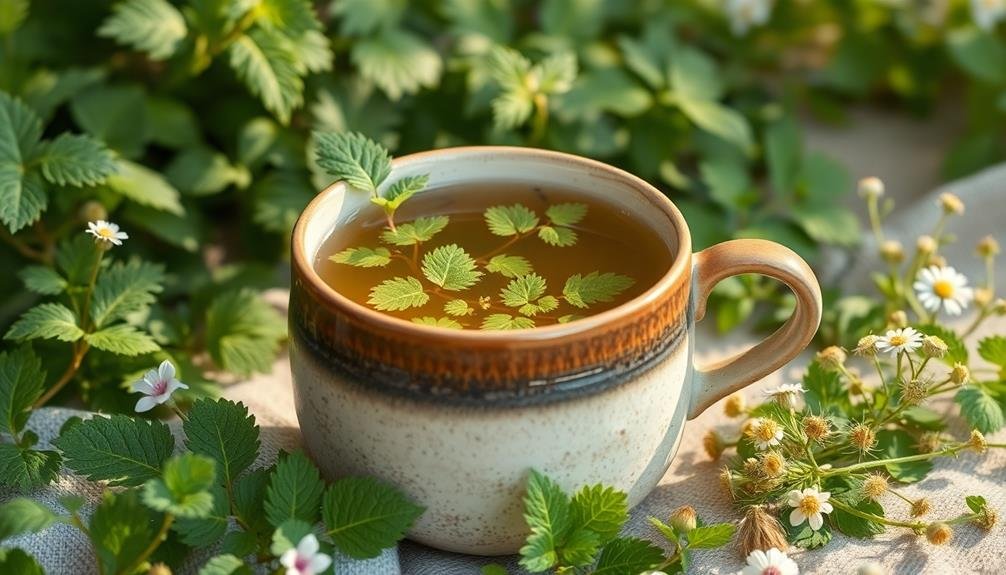
Nettle leaf is a powerful ally in the fight against seasonal allergies. This remarkable herb has been used for centuries, and it's known for its natural antihistamine properties. When you brew a cup of nettle tea, you're not just sipping a warm beverage; you're giving your body a chance to combat those pesky allergy symptoms.
Imagine the benefits you get from this herbal powerhouse:
- Rich in vitamins and minerals: Nettle leaf is loaded with vitamins A, C, K, and various B vitamins, along with essential minerals like iron, calcium, and magnesium.
- Supports immune function: The nutrients in nettle leaf can help boost your immune system, making it more resilient against allergens.
- Natural anti-inflammatory: It can help reduce inflammation, alleviating swelling and irritation caused by allergies.
- Detoxifying properties: Nettle leaf acts as a natural diuretic, helping to flush out toxins and support overall health.
Incorporating nettle leaf into your daily routine can make a noticeable difference in how you feel during allergy season. Brew some today and experience its benefits for yourself!
Ginger's Anti-Inflammatory Benefits
Ginger, with its potent anti-inflammatory properties, can be a game-changer for those suffering from seasonal allergies. When you brew ginger tea, you're not just enjoying a comforting beverage; you're also harnessing its ability to reduce inflammation in your respiratory system. This can help alleviate symptoms like a runny nose, sneezing, and itchy eyes.
Incorporating ginger into your routine is simple. You can either drink ginger tea or add fresh ginger to your meals. To maximize its benefits, consider the following:
| Benefits | How to Use | Tips |
|---|---|---|
| Reduces inflammation | Brew ginger tea | Add honey for extra flavor |
| Eases respiratory issues | Use in cooking | Combine with lemon juice |
| Boosts circulation | Infuse in water | Drink warm, not hot |
Rooibos for Immune Support
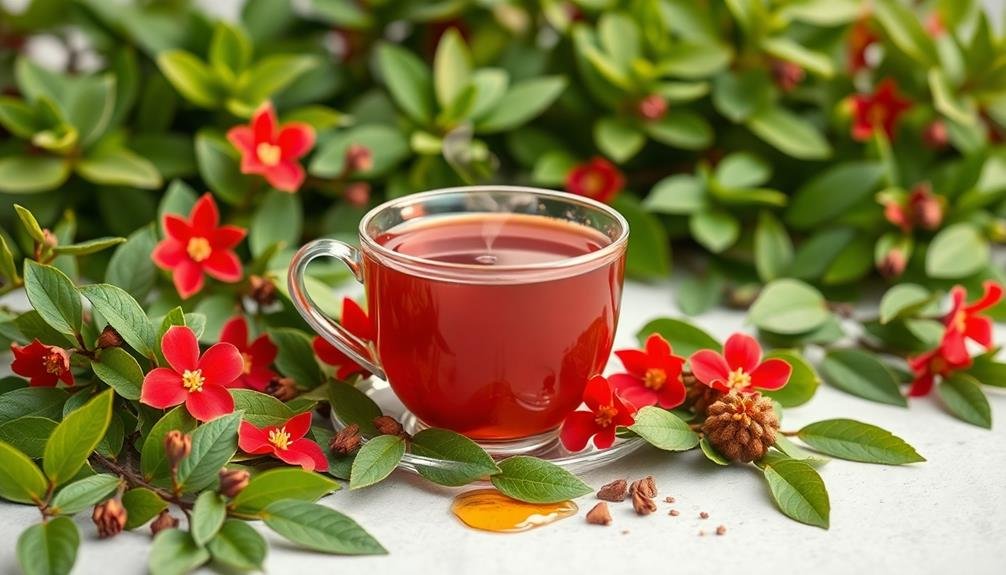
Rooibos tea embodies the essence of natural immune support, making it an excellent choice for those battling seasonal allergies. Rich in antioxidants, this caffeine-free herbal tea helps to bolster your immune system, providing you with the resilience needed to face allergy season head-on.
When you sip on rooibos, you're not just enjoying a delicious beverage; you're also inviting a wealth of health benefits into your life. Imagine this:
- Vibrant red hue that brightens your cup, signaling its rich antioxidant content.
- Earthy, sweet aroma that soothes your senses and calms your mind.
- Smooth, velvety texture that glides effortlessly across your palate.
- Natural sweetness that makes it perfect on its own or with a hint of honey.
With its high levels of flavonoids, rooibos tea helps to combat inflammation, which can worsen allergy symptoms.
So, whether you're sipping it warm or iced, embracing rooibos in your daily routine can be a delightful way to enhance your overall wellness while fending off those pesky seasonal allergies.
Enjoy the support it offers as you navigate through allergy season!
Blending Your Own Herbal Tea
Creating your own herbal tea blends can be a rewarding and enjoyable experience. You get to tailor your tea to suit your taste preferences and specific health needs, especially when it comes to easing seasonal allergies.
Start by choosing a base herb known for its allergy-relieving properties, like peppermint or chamomile. These herbs not only taste great but also offer soothing benefits.
Next, consider adding other herbs that complement your base. For instance, you might mix in some ginger for its anti-inflammatory effects or lemon balm for its calming properties. Experiment with ratios until you find the perfect balance. Remember, it's all about personal preference, so don't be afraid to get creative!
Once you've settled on a blend, try to keep track of the ingredients and their amounts. That way, you can recreate your favorite mixes or adjust as needed. You might also want to incorporate dried fruits or spices for a unique twist.
Brewing Tips for Maximum Benefits
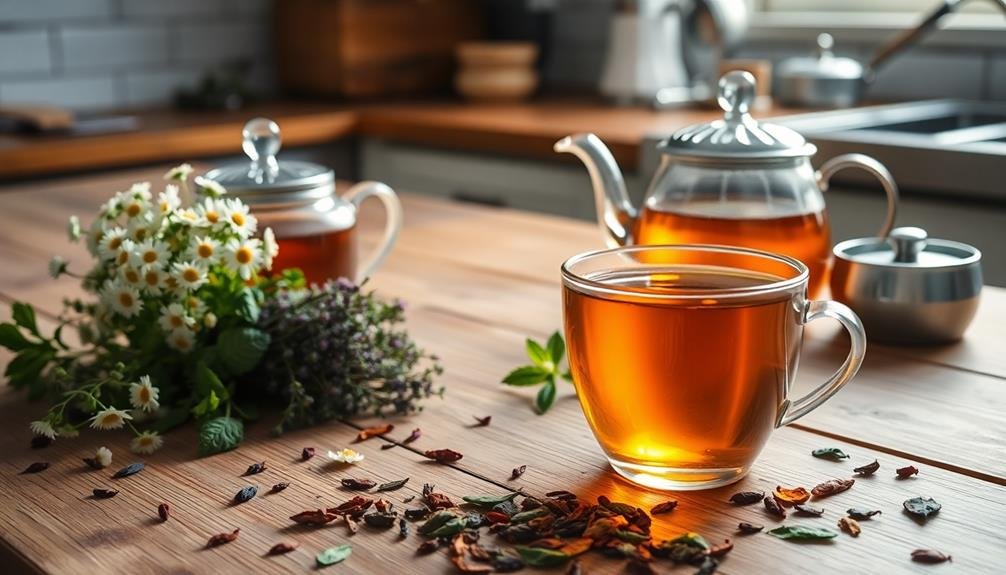
To get the most out of your herbal tea blends, pay attention to your brewing method. The right technique can enhance the flavors and benefits of your chosen herbs, making your tea not only enjoyable but also more effective against seasonal allergies.
Here are a few tips to keep in mind:
- Use fresh ingredients: Fresh herbs pack more potency than dried ones, so consider using them when possible.
- Temperature matters: Different herbs require different brewing temperatures. For delicate flowers, like chamomile, use water just below boiling, while tougher roots, like ginger, can handle boiling water.
- Steep time: Allow your tea to steep for the right amount of time—generally 5 to 10 minutes. This guarantees you extract all those beneficial compounds without bitterness.
- Cover your cup: While steeping, cover your cup with a lid or plate. This keeps the steam and essential oils from escaping, maximizing flavor and benefit.
Enjoying Your Herbal Teas
Sipping on a warm cup of herbal tea can be a delightful experience, especially when you're seeking relief from seasonal allergies. The soothing warmth and aromatic scents can create a calming atmosphere, helping you unwind while easing your symptoms.
To truly enjoy your tea, take a moment to appreciate its appearance and aroma before you drink. When you've brewed your tea, let it cool slightly to a comfortable temperature. This not only enhances the flavor but also protects your throat from irritation.
As you sip, focus on the taste and texture, noting any subtle flavors that may emerge. You might find that adding a touch of honey or lemon can elevate the experience, while also providing additional soothing properties.
Pairing your tea with a quiet moment—whether it's reading a book, meditating, or simply enjoying nature—can amplify its benefits. Feel free to experiment with different herbal blends, too. Each variety may offer unique effects, so you'll likely find a favorite that suits your needs.
Ultimately, taking the time to savor your herbal tea can transform it into a comforting ritual that supports your well-being during allergy season.
Frequently Asked Questions
Can Herbal Teas Replace Allergy Medications Completely?
You might find herbal teas helpful for mild allergy symptoms, but they can't completely replace allergy medications for everyone. It's best to consult your doctor before making any changes to your allergy management plan.
How Long Does It Take for Herbal Teas to Work?
Herbal teas typically start working within 30 minutes to a couple of hours, depending on the individual and the ingredients used. You'll notice relief as the natural compounds enter your system and alleviate symptoms.
Are There Any Side Effects of Herbal Teas?
Yes, there can be side effects from herbal teas. You might experience nausea, headaches, or allergic reactions, especially if you're sensitive to certain herbs. It's important to know the ingredients before consuming any herbal tea.
Can Children Drink Herbal Teas for Allergies?
Yes, children can drink certain herbal teas for allergies, but it's essential to consult a pediatrician first. Some herbs can cause adverse reactions, so always choose safe options and monitor your child's response closely.
What Is the Best Time to Drink Herbal Teas for Allergies?
You should drink herbal teas for allergies when symptoms flare up, preferably early in the morning or before bedtime. This timing helps maximize their soothing effects, allowing you to breathe easier throughout the day and night.
In Summary
Embracing herbal teas is a natural way to ease your seasonal allergies while boosting your overall well-being. By exploring options like chamomile and rooibos, you can find relief and support your immune system. Don't hesitate to blend your own unique combinations and experiment with brewing techniques for maximum benefits. So, grab your favorite herbs, brew a soothing cup, and enjoy the comforting flavors as you tackle those allergy symptoms head-on!

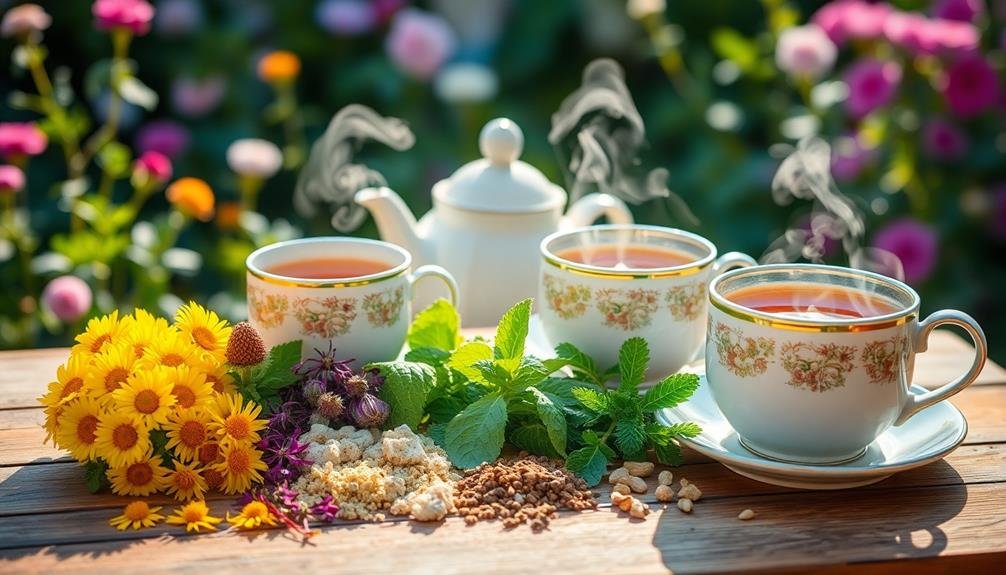
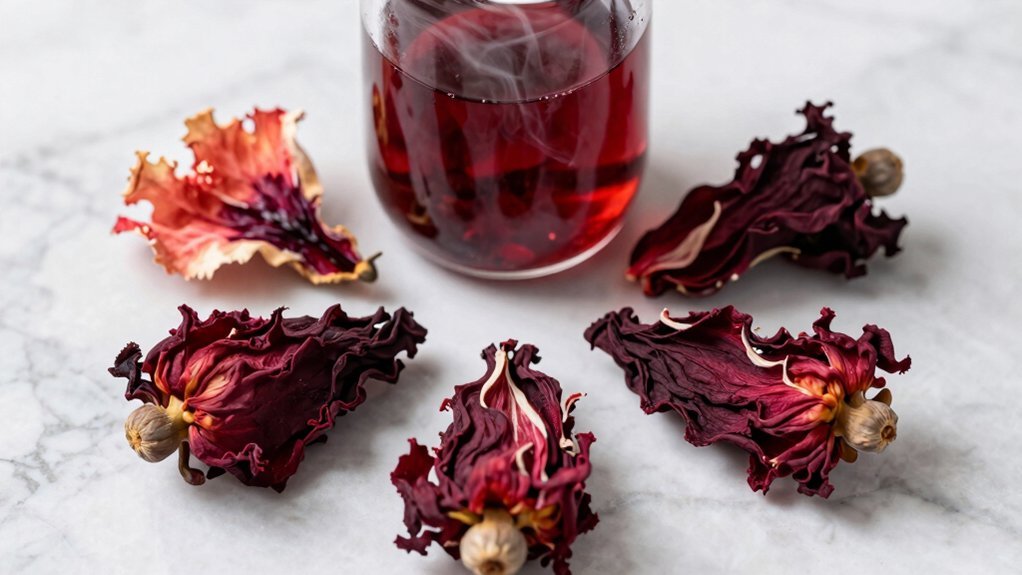


Leave a Reply